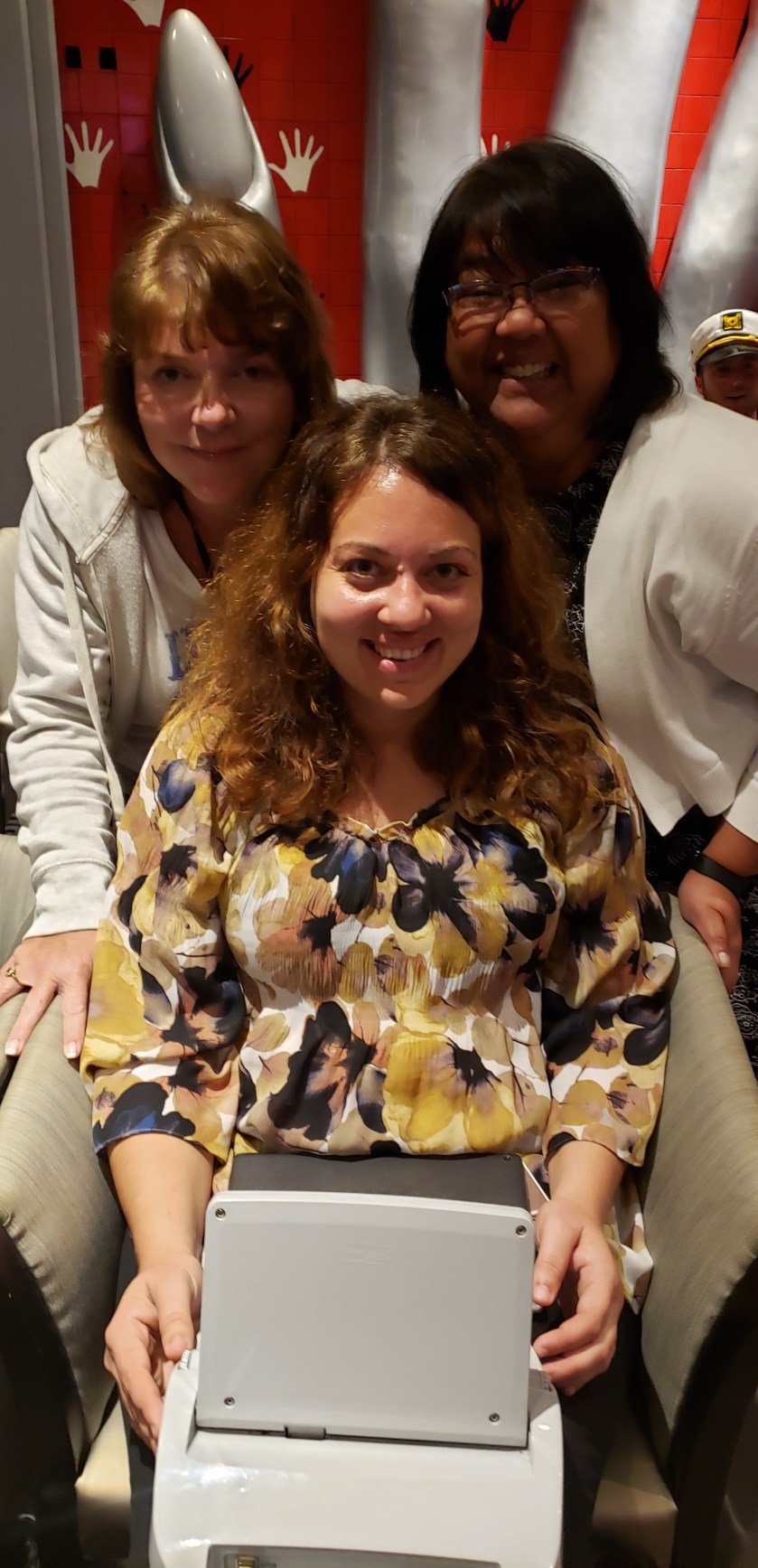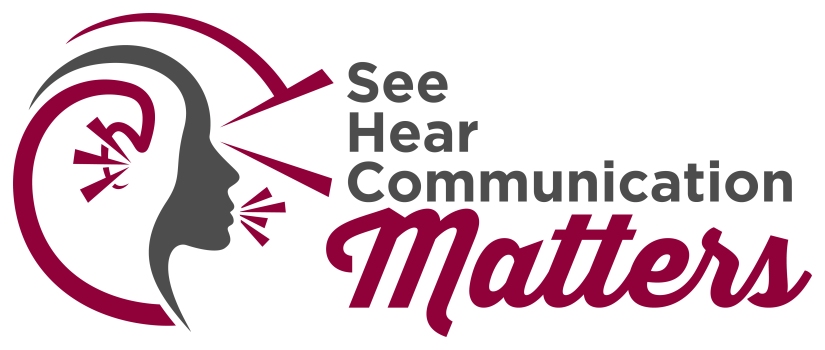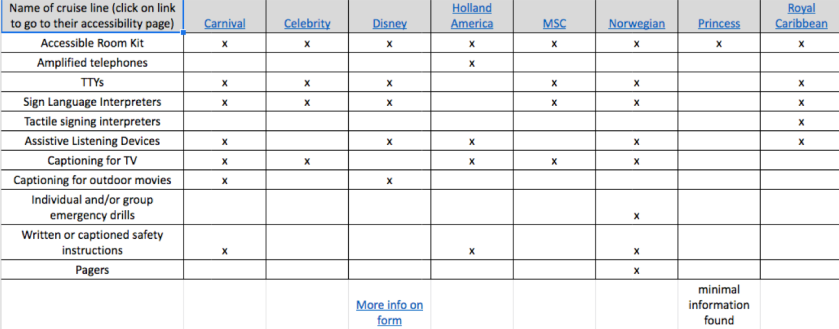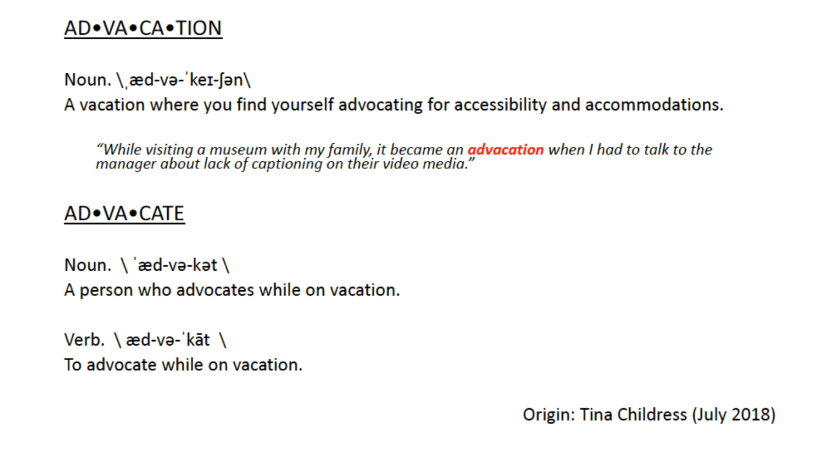

In the dead heat of summer, my friend casually mentioned on a fb chat that she and her family were going to be celebrating New Year’s Eve on a cruise ship. I was intrigued and then elated when I saw the “…” (indicating active typing) on our chat followed by “The invitation is there if y’all can go.” A quick check with hubby and we (somewhat impulsively) decided that we would join them!
I hadn’t been on a cruise since I was 16 and my family had never gone so this would be an entirely new experience for us. On the other hand, my friend, Lisa, had been on several cruises with different members of her family and was well-versed on the ins and outs of cruise life. Lisa and I are both late-deafened – I am ASL-fluent and she knows a handful of signs. We are both excellent spoken language communicators and rely on visual information and lipreading in difficult listening situations. This meant that in terms of accommodations to access any audible information such as public announcements or hear (and UNDERSTAND!) people on stage for a show, real-time captioning would be needed so it was accessible to both of us.
I have been deaf for about 20 years now but when I started my career in audiology, I had normal hearing. The Americans with Disabilities Act (ADA) will be celebrating its 30th anniversary this year.
“First introduced in the 100th Congress, the ADA bans discrimination on the basis of disability in the areas of employment, public accommodation, public services, transportation and telecommunications. President George H.W. Bush signed the ADA into law on July 26, 1990.” [ref.]
As a former hearing person who now benefits from the ADA for accommodations, I am (unfortunately) not surprised at how often I have to remind the-powers-that-be what my rights are. Most of the time, it’s a matter of educating them about these rights and providing them with resources. They don’t know what they don’t know. There have been other times where they just flat out seemed to want to refuse on principle. In these situations, I tend to roll up my sleeves, dig in my heels and go into advocate mode. Getting captioning for this cruise was no exception – it was time to “advacate” (see definition above).
When you register for a cruise, there are sections where you indicate if you have a disability and what your needs are. I just went down the rabbit hole to find the disability services pages for the major cruise lines and it was fascinating to see what they offer/don’t offer.
I couldn’t figure out how to easily add a table to this post but you can see a larger and clickable version of the above table at http://bit.ly/CruiseLineAccessibilityDHH. Some of the information was really hard to find or not even listed on the website itself but rather on a form that you have to fill out. Click on the name of the cruise line in the table to go straight to their disability services page.
Here are the important points that you need to know:
-
Cruise ships, whether they are American or foreign, that cruise in U.S. waters are subject to the ADA. [ref.]
-
These accommodations are provided to you AT NO COST so be sure no one is trying to charge you extra or insist that you bring your own accommodations on board. This includes paying travel, lodging and incidentals for interpreters and captioners. [ref.]
-
Even if they don’t list them on their accessibility pages, you CAN request accommodations that provide you with EFFECTIVE communication (e.g., real-time captioning, ASL interpreter, tactile interpreter, assistive listening device, written scripts, preferential seating for access to visual cues, etc.) . [ref.]
This last point is the reason that I wrote this blog post. NONE of the cruise line accessibility websites mentioned real-time captioning as an accommodation on the ship. *If* they offered any kind of communication accommodation, it was ASL interpreters and/or assistive listening devices – these were the two options offered repeatedly (!) to us. Yet, for multitudes of deaf, late-deafened and hard of hearing individuals, real-time captioning might be the preferred accommodation for events like stage shows, musical numbers, trivia games, etc. because:
- they don’t know sign language (e.g., my friend)
- assistive listening devices can be ineffective if:
- the microphone is not properly used (if the person is even using a mic!)
- in large, reverberant and highly noisy areas
- if the individual does not have good aided speech perception/word recognition skills (it’s like turning up the volume on a radio station that’s not in tune – it doesn’t help)
Here is my initial email to them:

One of the most important things I’ve learned about arranging for accommodations is be very specific about the accommodations that you are requesting. They don’t know that I’m late-deafened and that I prefer captions for some things and interpreters for other things. They don’t know that you might not know sign language (many assume that if we put down “deaf” or “hard of hearing” that we sign). They don’t know that you need preferential seating so that you can speechread. They don’t know that you don’t benefit from assistive listening devices. They can’t read our minds so we have to let them know what works best for us.
Don’t wait until last minute to request accommodations. If there are hiccups or cancellations, then hopefully you’ll have enough time to go to Plan B. I’m somewhat of a hyper-planner (!!) so I started this process 5 months ahead of time. Some of the websites ask for 60 days’ notice – I would probably start trying to plan around 3 months ahead of time.
Another thing I’ve learned is document, document and document. Save all emails, correspondence, etc. so you have a paper trail in case there are any disagreements or misunderstandings.
Have a designated point-of-contact on the boat in case there are problems. In our case, it was our captioner who had a direct line (a la “Batphone”) with the cruise staff. We had a great relationship with our captioner so felt comfortable asking her to contact them if there were concerns.
Lastly, know your rights. In the table above, there are some links to some case law as well as how cruises are covered under the ADA. Be prepared to drop some of those links in your emails to let them know that you know you are entitled to effective communication.
“…cruise lines are prohibited from discriminating against passengers on the basis of their disability by “fail[ing] to take such steps as may be necessary to ensure that no individual with a disability is excluded, denied services, segregated or otherwise treated differently than other individuals because of the absence of auxiliary aids and services.” [ref.]
After going back and forth in emails, they ultimately agreed to provide real-time captioning after trying to force us to use ASL interpreters or Assistive Listening Devices. I can’t help but wonder if it’s because I cited the judgment against them [ref.]. I don’t know if it’s because the person I was corresponding didn’t know themselves or if they really just didn’t want to offer captioning as an option. I had spoken to several deaf/hard of hearing friends prior to this cruise and I *knew* that captioning was possible. We just needed to be persistent.
Our real-time captioner, Julia, was WONDERFUL. She had been a captioner on almost twenty cruises prior to this one and she was assigned to me and Lisa. Luckily, Lisa and I wanted to go to the same events otherwise it could have gotten complicated.
When you arrange for an ASL interpreter or a real-time captioner, I highly recommend asking that the person be assigned to you or your group alone or that you know how many other deaf/hard of hearing people might be vying for their time. This way you know what to expect. The advantages of having an assigned person is that I can communicate directly with them and let them know on the fly where I want to go or that I’m pooped and I just want to take the afternoon off, ears off. This is what hearing people get to do (decide last minute) so that should also be an option for us. We tended to use her services in the evening for shows and performances but we had the option to use her for events in the afternoon as well. We lucked out in that we were the only deaf/hard of hearing individuals on the ship. The captioner said that she had been in a situation where she was the only captioner and there were multiple groups that had to agree which events she would caption. Next time, I will definitely follow my own advice about requesting someone be assigned to me.
Not all captioners have/provide the same equipment but this is what our captioner had:
- Stenograph machine for word-for-word Communication Access Realtime Translation (CART) transcription (same machine used by stenographers in a courtroom)
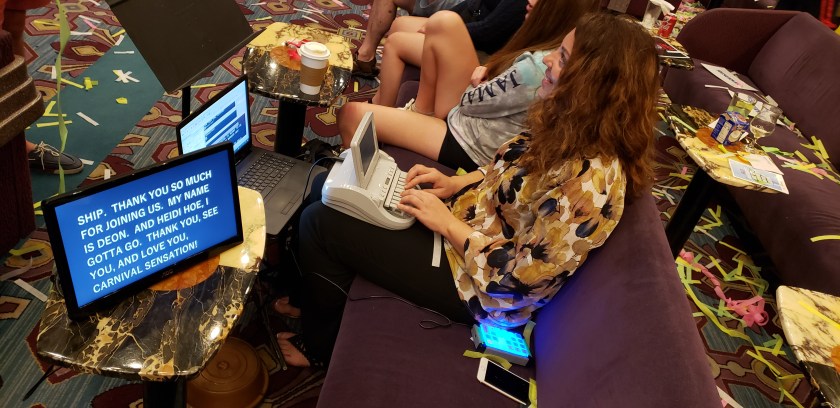
- Interface to make it easier to advance lines on pre-scripted material (lyrics to music during the shows)
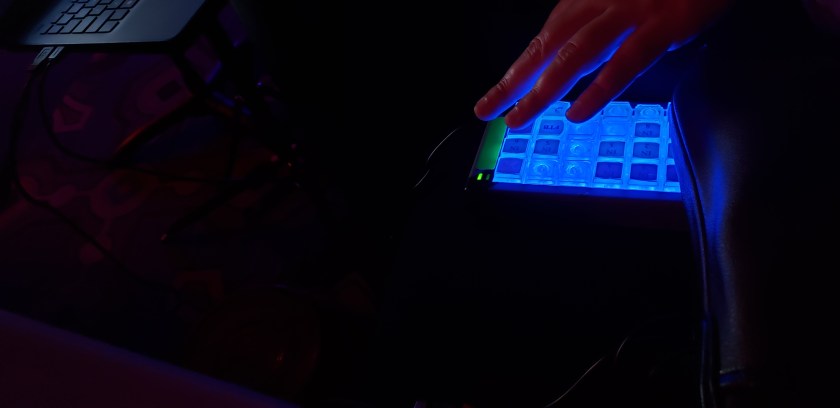
- External monitor hard wired to her equipment so we could read the captions (yes, this show had lots of lyrics in Spanish!)
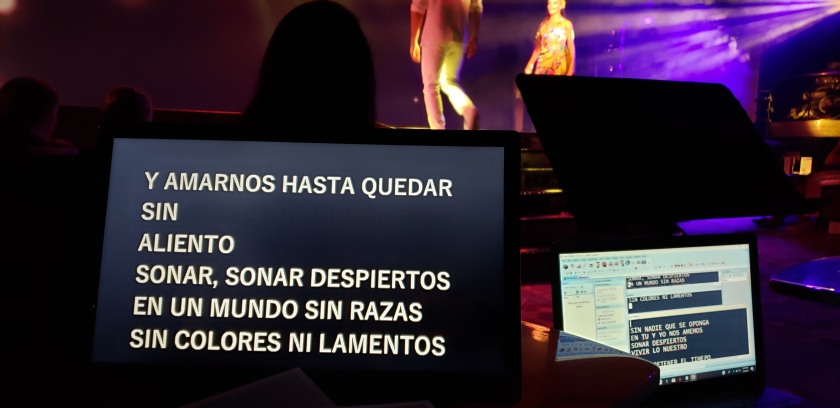
- Portable tablets so could read the captions
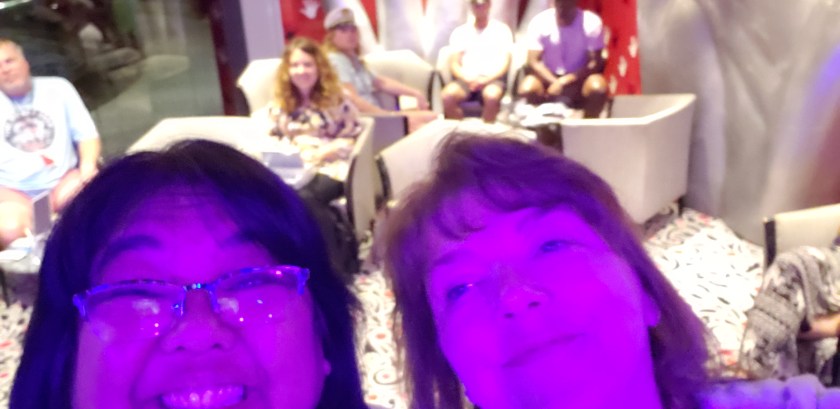
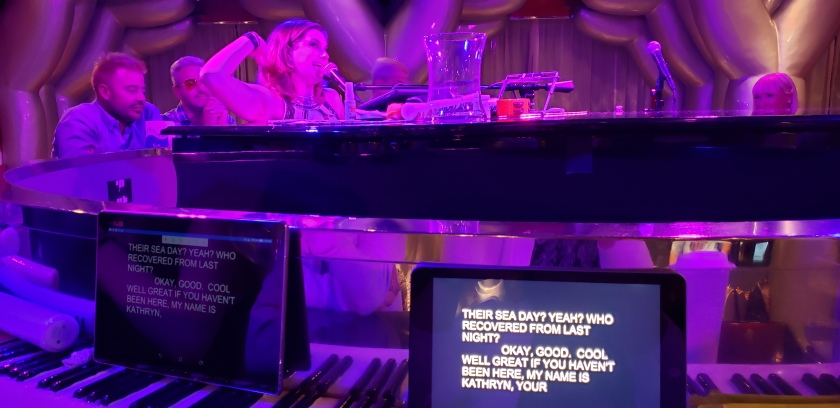
- Harness for walking CART which we ended up not using (this could have been used for something like walking tours on the ship or off-boat if it was a ship-sanctioned activity)

Despite having to be a bit assertive in the initial planning stages, this whole experience was outstanding. I learned a lot and hope you learned something, too. Planning ahead is key.
Happy (accessible) cruising!
